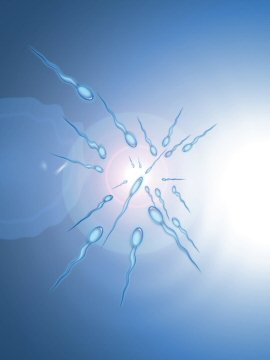 The journal Human Reproduction recently published findings indicating that men who eat an average of half-a-serving of soy food a day have lower concentrations of sperm than men who do not eat soy foods. The effect was particularly marked in men who were overweight or obese, according to study author Dr Jorge Chavarro, from the Harvard School of Public Health. Perhaps unsurprisingly, the findings have attracted a strong rebuke from the Soyfoods Association of North America.
The journal Human Reproduction recently published findings indicating that men who eat an average of half-a-serving of soy food a day have lower concentrations of sperm than men who do not eat soy foods. The effect was particularly marked in men who were overweight or obese, according to study author Dr Jorge Chavarro, from the Harvard School of Public Health. Perhaps unsurprisingly, the findings have attracted a strong rebuke from the Soyfoods Association of North America. Chavarro's study set out to examine the relationship between semen quality and phytoestrogens (plant compounds that can behave like the hormone estrogen). He analyzed the intake of 15 soy-based foods in 99 men attending a fertility clinic with their partners to be evaluated for sub-fertility. Chavarro found that the men who ate the most soy food had 41 million sperm per milliliter less than the men who did not consume soy products. The "normal" sperm concentration for men ranges between 80-120 million/ml, so the observed effect is not trivial.
But other experts have questioned Chavarro's findings. "This study is confounded by many issues, thus I feel the results should be viewed with a great deal of caution," warned Dr. Tammy Hedlund, a researcher in prostate cancer from the University of Colorado Health Sciences Center. Hedlund pointed out that Chavarro's analysis found that "soyfood and soy isoflavone intakes were unrelated to total sperm count, ejaculate volume, sperm motility, or sperm morphology," which are the more traditional measures of sperm quality and male fertility. She also noted that the study did not determine directly what other foods, medications, supplements, existing medical conditions, sexual activities or environmental factors may have directly affected the drop in sperm count.
Perhaps more importantly, Chavarro found that the men with the highest soyfood intake produced more ejaculate fluid volume with equivalent sperm counts as those with lower intakes. Thus, the number of sperm was not significantly different, however this larger volume lead to the lower sperm concentrations (millions per millimeter) in the higher intake individuals. According to Hedlund, this watering-down effect of sperm concentration should not be mistakenly associated with a decrease in fertility.
It's also possible that obesity may be behind the effect Chavarro observed. He found high soyfood intakes are associated with lower sperm concentration but "the association was more pronounced among overweight and obese men than among lean men." It has been previously established that men with high levels of body fat are likely to produce more estrogen than their slimmer counterparts.
Chavarro speculates that increased estrogenic activity may have an adverse effect on the production of sperm by interfering with other hormonal signals. This effect could be strengthened further in overweight and obese men because men with high levels of body fat produce more estrogen than slimmer men, leading to high overall levels of estrogen in the body and reproductive organs.
Related:
Soy Foods Increase Semen Quantity, Lower Sperm Quality
Soy Consumption Combats Baldness, Prostate Growth
Diet And Lifestyle May Reverse Prostate Cancer
Sources: European Society for Human Reproduction and Embryology, Soyfoods Association of North America





